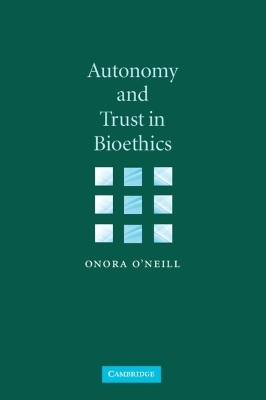
Autonomy and Trust in Bioethics
Seiten
2002
Cambridge University Press (Verlag)
978-0-521-89453-1 (ISBN)
Cambridge University Press (Verlag)
978-0-521-89453-1 (ISBN)
In this important book, Onora O'Neill suggests that the conceptions of individual autonomy so widely relied on in bioethics are philosophically and ethically inadequate, and that they undermine rather than support relations of trust. Her book will appeal to a wide range of readers in ethics, bioethics and related disciplines.
Why has autonomy been a leading idea in philosophical writing on bioethics, and why has trust been marginal? In this important book, Onora O'Neill suggests that the conceptions of individual autonomy so widely relied on in bioethics are philosophically and ethically inadequate, and that they undermine rather than support relations of trust. She shows how Kant's non-individualistic view of autonomy provides a stronger basis for an approach to medicine, science and biotechnology, and does not marginalize untrustworthiness, while also explaining why trustworthy individuals and institutions are often undeservingly mistrusted. Her arguments are illustrated with issues raised by practices such as the use of genetic information by the police or insurers, research using human tissues, uses of new reproductive technologies, and media practices for reporting on medicine, science and technology. Autonomy and Trust in Bioethics will appeal to a wide range of readers in ethics, bioethics and related disciplines.
Why has autonomy been a leading idea in philosophical writing on bioethics, and why has trust been marginal? In this important book, Onora O'Neill suggests that the conceptions of individual autonomy so widely relied on in bioethics are philosophically and ethically inadequate, and that they undermine rather than support relations of trust. She shows how Kant's non-individualistic view of autonomy provides a stronger basis for an approach to medicine, science and biotechnology, and does not marginalize untrustworthiness, while also explaining why trustworthy individuals and institutions are often undeservingly mistrusted. Her arguments are illustrated with issues raised by practices such as the use of genetic information by the police or insurers, research using human tissues, uses of new reproductive technologies, and media practices for reporting on medicine, science and technology. Autonomy and Trust in Bioethics will appeal to a wide range of readers in ethics, bioethics and related disciplines.
Onora O'Neill is Principal of Newnham College, Cambridge, and has written widely on ethics and political philosophy.
Preface; Frontispiece; 1. Gaining autonomy and losing trust?; 2. Autonomy, individuality and consent; 3. 'Reproductive autonomy' and new technologies; 4. Principled autonomy; 5. Principled autonomy and genetic technologies; 6. The quest for trustworthiness; 7. Trust and the limits of consent; 8. Trust and communication: the media and bioethics; Bibliography; Institutional bibliography; Index.
| Erscheint lt. Verlag | 18.4.2002 |
|---|---|
| Zusatzinfo | 1 Halftones, unspecified |
| Verlagsort | Cambridge |
| Sprache | englisch |
| Maße | 154 x 229 mm |
| Gewicht | 330 g |
| Themenwelt | Geisteswissenschaften ► Philosophie |
| Studium ► 2. Studienabschnitt (Klinik) ► Humangenetik | |
| Naturwissenschaften ► Biologie | |
| ISBN-10 | 0-521-89453-0 / 0521894530 |
| ISBN-13 | 978-0-521-89453-1 / 9780521894531 |
| Zustand | Neuware |
| Haben Sie eine Frage zum Produkt? |
Mehr entdecken
aus dem Bereich
aus dem Bereich
Eine sehr persönliche Geschichte | Der New York Times-Bestseller
Buch | Softcover (2023)
Ullstein Taschenbuch Verlag
21,99 €
Die revolutionäre Medizin von morgen (Lifespan)
Buch | Softcover (2020)
DuMont Buchverlag
16,00 €


